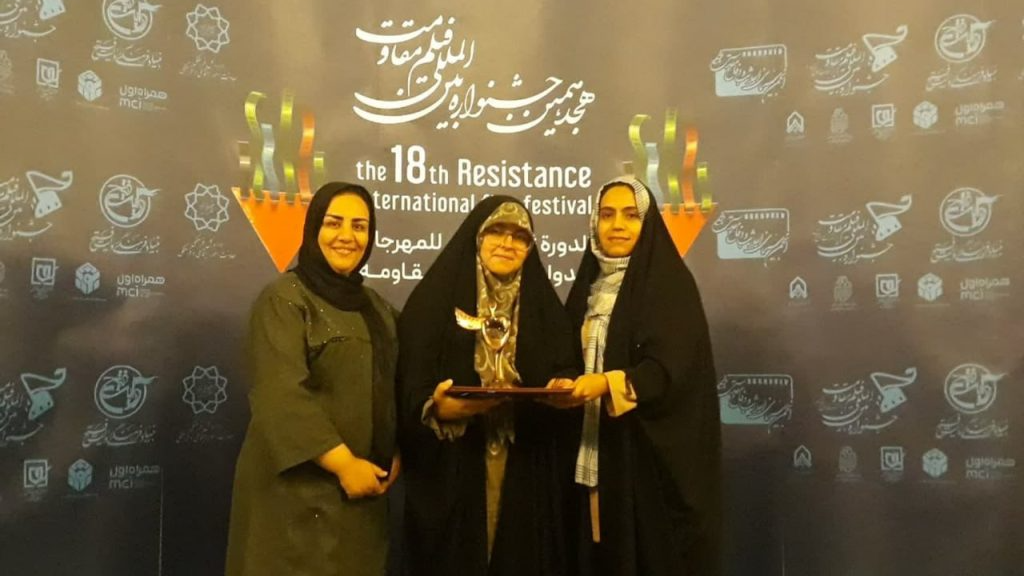Exclusive | From Balkhab to Resistance Festival
DIDPress: “From the Land of Balkhab” is a documentary portraying the resilience and daily struggles of the people of Balkhab, a region in northern Afghanistan. Directed by Zohra Sadat Fazeli, the film offers a profound and human-centered narrative of a community that, despite war and insecurity, remains deeply rooted in its cultural identity.

This exclusive interview by DidPress features Zohra Sadat Fazeli, the Afghan filmmaker, who directed the Land of Balkhab, which recently won the top international award at the 18th Resistance International Film Festival in Tehran. This annual event celebrates cinematic works that focus on themes of resistance and defiance against oppression, showcasing films from across the globe.
The documentary was produced by Eshraq Film Club of the Center for Art and Media, under the Deputy for Virtual Space, Art, and Media of the Islamic propagation Office.
DIDPress: Please introduce yourself to our readers.
Zohra Sadat Fazeli: I am Zohra Sadat Fazeli from Balkhab district of Sar-e Pul province, Afghanistan. I hold a Master’s degree in Religion and Media Studies.
Tell us about the concept, production, and journey of “From the Land of Balkhab” to the Resistance International Film Festival.
Zohra Sadat Fazeli: Shi’a scholars in Afghanistan have always played a significant role in preserving and promoting religious and cultural identity. In recent decades, the Islamic Revolution in Iran has had a profound impact on their religious and cultural outreach.
Considering we live in the age of digital communication, where mass and social media have wide influence, we decided to present our findings in the form of a documentary.
The central subject of the film is Ayatollah Sayed Jafar Fazeli and his religious and cultural efforts in Balkhab. The documentary aims to offer a deeper understanding of the cultural and social relations between Afghanistan and Iran and their mutual influences.
We gathered data and conducted audio-visual interviews, organizing the material into a coherent documentary timeline. The outcome of this analysis led to a message of unity among Muslims in Afghanistan and across the world—a unity that, God willing, will one day lead to the downfall of global arrogance, particularly the U.S. and Israel.
Among the proposed topics submitted to the Department of Virtual Space, Arts, and Media, this one was approved. Pre-production began in October 2022, and the film took about a year to complete.
From the Land of Balkhab premiered in February 2024 and won the Best First-Time Director award at the Eshraq Festival. It was later submitted to the Resistance International Film Festival.
What inspired you to choose Balkhab as the subject of your documentary?
Zohra Sadat Fazeli: Although several initial themes were proposed—covering social issues, women, and cultural activism—I chose Balkhab because I am originally from this region. Being familiar with its religious, cultural, and historical background gave me stronger access to relevant subjects, making it a natural and personal choice.
What aspects of Balkhab—social, cultural, or political—does your film emphasize? What is its core message?
Zohra Sadat Fazeli: While the film is primarily centered around the religious and cultural work of Ayatollah Sayed Jafar Fazeli, it also introduces the viewer to the geography, educational development, and cultural transformation of the Balkhab region.
As an Afghan female documentary filmmaker, how did you navigate the production process, and what challenges did you face?
Zohra Sadat Fazeli: In Afghanistan’s traditional and religious society, especially in the media production space, it’s often difficult for women to justify such involvement. However, my professors at Shahida Bint al-Huda Seminary created a supportive environment, and the collaboration of the Department of Virtual Space, Arts, and Media was also critical.
By the grace of God and the blessings of the Ahl al-Bayt, the project was completed successfully and even won recognition.
Throughout the production, I gained valuable experience in storytelling and documentary techniques that align with our cultural and religious values. I also had the opportunity to practice one-person documentary filmmaking, which was a great learning journey.
Are you currently working on other projects?
Zohra Sadat Fazeli: I believe it is the duty of Afghanistan media professionals to highlight the lives of influential figures in our society—something that has been neglected. That will likely be the theme of my next documentary.
What message would you like to share with Afghan women and cultural activists?
Zohra Sadat Fazeli: I hope success and pride for all my fellow Afghans—especially the strong and capable women of this country. To Afghan women, I say: You are the heartbeat of this land. With your courage and determination, we can build a bright, inclusive, and advanced Afghanistan—free from ethnic, sectarian, and political divisions.
Let us remember history: foreign powers have always sought a weak and dependent Afghanistan to exploit its resources and even erase our religious and national identity. Only with unity and collective vision we can nurture dreams and shape a stronger future.